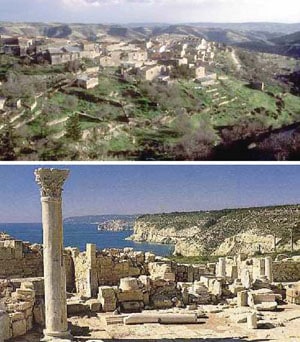Cyprus has experienced a great deal of change recently but still faces the future with a good deal of optimism

|
It has been an eventful year for the beautiful but divided eastern Mediterranean island of Cyprus.
The Turkish Republic of Northern Cyprus was declared in 1983 but has never been recognized by any country other than Turkey. Since 1974 Turkish Cypriots have seen their Greek Cypriot neighbors prosper while their own eco-nomic potential has remained largely undeveloped. Some analysts estimate that per capital income in the south is as much as six times greater than in the north. The EU has pledged to release around 260 million to Turkish Cypri-ots to boost their economy. Barriers to trade between northern and southern Cyprus are also in the process of being lifted. The Turkish Cypriot leadership also wants to be able to trade directly with Europe, a request that has received strong opposition from the south.
For the Greek Cypriots, it is hoped that accession to the EU will boost its sizable services sector and attract more foreign companies to join its thriving international banking and business community. Cyprus is the wealthiest of the 10 new EU members, with the highest per capita income. Its employ-ment rate is higher than any of the oth-er newcomers, and GDP growth is ex-pected to exceed 3% this year.
The Greek Cypriots hope to make the country a business bridge between Europe and the Middle East. Over the past 10 years much of the investment into Central and Eastern Europe and Russia has been channeled through Cyprus. The attraction of Cyprus for many companies is its favorable tax en-vironment, its strategic location, mod-ern banking and legal infrastructure, ex-cellent telecommunications network and educated workforce.
Cyprus is relatively low cost, highly advanced and very well situated for com-panies that want to do business with Eu-rope and the Middle East, says Costas Apostolides, chairman of EMS Econom-ic Management.It is also the only coun-try in the EU which has no restrictions on bringing in employees from the eight Central and Eastern European states that have just joined the EU, he adds.
Not only is there an extremely low 10% corporate tax rate, but dividends are also tax-exempt.Tax losses in Cyprus can also be carried forward indefinitely and set against future profits, and there is no capital gains tax on share dealing. Cyprus also has double-tax-avoidance treaties with 40 other countries.
The presence of so many internation-al companies in Cyprus has been accom-panied by the development of the coun-try as a regional telecommunications center. Cyprus has also recently restruc-tured its stock exchange in order to at-tract foreign investors. In September the Cyprus Stock Exchange launched a three-tier market in a bid to coax back investors burned by boom and bust cy-cles.The three tiers will be the main,par-allel and alternative markets, in addition tourists has been falling over the past two years. Cyprus is a relatively expensive destination,with relatively high wages,so we have to move to attract the higher-income tourists, says Apostolides.
While Turkish Cypriots have the most to gain in a material sense from removal of the green line, it is widely acknowledged that reunification would improve the economic prospects of the southern part of the island as well and make it even more attractive to outside investors and tourists. A solution [to the Cyprus problem] would make the whole island more attractive as a tourist location,says Apostolides.Trips to the north would become an additional sell-ing point for island holidays; they would also be an attraction for those who have visited the island before and would like a new experience, he adds.
Dennis Droushiotis, Republic of Cyprus trade commissioner to the US, comments: Reunification would bring to which there will be a market for in-vestment companies and one for bonds.
Resident economist Fiona Mullen comments: The Cyprus Stock Ex-change has been split into five categories, leaving only the 17 most profitable com-panies in the main index.These will also be listed on the Athens Stock Exchange; therefore, the hope is that, having got rid of the underperforming companies which listed during the 1999 bubble but should never really have listed in the first place, more foreign investors will be in-terested in buying Cypriot securities.
The Greek Cypriots are also in the process of expanding the airports at Lar-naca and Paphos, upgrading the marinas and developing plans to build five golf courses.The aim behind much of this is to target higher-income tourists. The contribution of tourism to the economy is of vital importance. But the number of many benefits. Cyprus would have a unified infrastructure system, be able to operate out of a central port and have a central telecommunications system. He adds that the benefits would be enor-mous in making Cyprus extremely effi-cient in carrying out international busi-ness and transit trade.
EU leaders are expected to decide at a summit in Brussels on December 17 whether to start negotiations for Turkeys entry to the EU but have ad-mitted it would be very difficult to do so without a peace deal on Cyprus. It all revolves around the EU decision on Turkish membership, says Dr. James Ker-Lindsay, a director of Civilitas Re-search. We are in a situation where, if nothing happens before December, then it could be a very long time before there is another chance of reaching a settlement, he adds.



